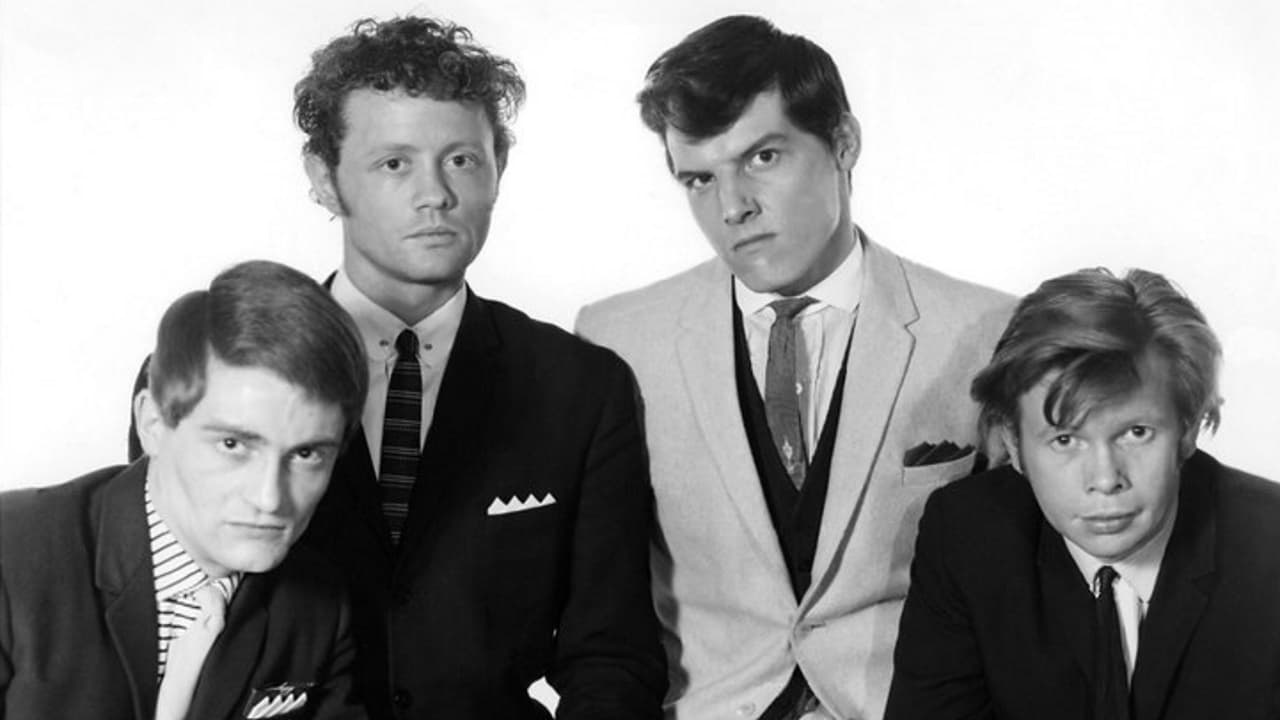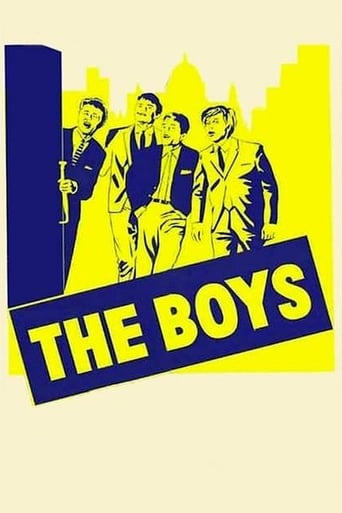Manthast
Absolutely amazing
Aedonerre
I gave this film a 9 out of 10, because it was exactly what I expected it to be.
Catangro
After playing with our expectations, this turns out to be a very different sort of film.
Married Baby
Just intense enough to provide a much-needed diversion, just lightweight enough to make you forget about it soon after it’s over. It’s not exactly “good,” per se, but it does what it sets out to do in terms of putting us on edge, which makes it … successful?
ianlouisiana
This is a very clever movie and a rather daring one.Anyone who has ever sat through a jury trial either as a spectator or a participant will recognise that the formula "The Boys" uses is based strictly on the court proceedings.The Prosecution,unemotional,cold,precise,outline the case and submit the evidence of the witnesses.As prima facie evidence of the defendants' guilt comes to light,the jury/audience,bombarded with these apparent facts has little doubt of their culpability.By the time The Prosecution has rested there will be a groundswell of opinion that they have proved their case.But then the Defence,declamatory,not fettered by the rules of evidence,highly emotional,puts forward its rebuttal of all that has gone before.Invariably it is given more licence by the judge and invariably it takes advantage of this - as it has every right to do.Doubts about the defendants' guilt begin to creep in.The judge sums up,his parting words being..."The truth,members of the jury,is for you and you alone to decide". In this case it is a Capital Trial,the charge being one of murder in the furtherance of theft,by 1962 one of the few offences that could get you hanged.By then juries were notoriously reluctant to convict for such a crime even if faced with overwhelming evidence.Were "The Boys" just four ordinary lads on a night out,short of money,but determined to make the best of things,or were they the 1960s equivalent of out - of - control so - called feral teenagers,a menace to all who were unfortunate enough to cross their paths as they seek to commit mindless violence? Evidence for both propositions is submitted,the home life of these young boys is examined at some length and just when you might be thinking that they are unfortunates trapped in the seemingly inescapable cycle of low wages,low expectations ,disillusioned and disenfranchised,and now demonised by the police and the disapproving middle classes who are trying to keep them in their place,two of them break down under cross - examination.They were guilty after all. All that is left for the Defence is an impassioned plea for clemency,not unlike that of Orson Welles in the near contemporary "Compulsion". Mr Robert Morley is suitably flamboyant as the Defence Counsel,a man who gives every appearance of having become emotionally involved in the plight of his clients.Mr Richard Todd,the Prosecution,is all business. When he breaks through the boys' lies in the witness box it is just another day at the office to him. The Boys themselves are perhaps a little too lower middle class to appear at home in terrace house and tenement,but the overall feel of the movie is just right for the time. In the end it is the adversarial nature of British Justice that has come under examination.The innocence or guilt of The Boys - two of whom were old enough to be hanged - to be decided in the light of the relative eloquence and ability of their advocates.The message is clear enough - the truth is too precious to be left in the hands of lawyers.Yet what we have in "The Boys" is a demonstration that the law - made in the first place by lawyers -is debated by two lawyers in front of another lawyer who will make a decisison that,likely as not,will later be debated by another panel of lawyers who,in turn,will make a decision that,if it displeases one of the lawyers,will be put before yet another panel of lawyers. Somewhere,under all that lawyering,the truth lies bleeding.
Martin Bradley
This social-conscience movie, made in Britain in the early sixties, makes an earnest plea for the abolition of the death penalty and though it's couched in the form of a courtroom drama, (the whole film is the trial with flashbacks leading up to the events in question in the form of the evidence given by the witnesses and the defendants), it lacks the urgency and excitement that you expect from either a good thriller or even a half-decent social conscience movie. Instead it plods along from one scene to the next as first the witnesses give their evidence then the defendants contradict it.The boys are Dudley Sutton, Jess Conrad, (a British pop star of the time cast obviously to draw the youth market), Ronald Lacey and Tony Garnett, (yes, that Tony Garnett before going on to fame as producer of real social-realist films made mainly for television), and they stand accused of killing a night-watchman as they tried to rob a garage. The film bounces back and forth between the courtroom and the night in question; (the courtroom scenes are dull and talkative and aim for an air of 'authenticity'). The prosecuting counsel is Richard Todd who can't seem to muster any enthusiasm while Robert Morley stands for the defence. Morley is the best thing about the film; he's lively and he gives the film something of a buzz. (He also gets to do the 'serious' speech at the end). Ultimately it's the kind of movie that at half its length and done on TV might just have made an impact but on a widescreen and at two hours plus just seems to drag on forever. Give me Judge Judy any day.
normanmiller61
I came across this film channel-hopping late one night and got instantly hooked, partly by wondering how the writer might twist the courtroom action but mainly for the fabulous B/W images of working class London in the era between the dreary 50s and the swinging 60s.Well worth watching, too, for a sterling cast of British troupers, as well as a genuinely unexpected ending.And good, too, to see some political awareness slipped into the action with its portrayal of working-class Londoners, as well as an acknowledgement of boredom - not many many films are brave enough to show their characters genuinely trying to deal with boredom!
lucy-66
Four working class boys are accused of stabbing a night watchman at a garage for the money in the cashbox. It starts slowly as a courtroom drama, with lawyers and witnesses apparently attempting feeble comic turns. Where's the director? you wonder. Surely lawyers don't behave like this. The only good bits in this preamble are the flashbacks to the witnesses' encounters with the boys.Then Robert Morley as the boys' defence lawyer visits them in the cells and zap! the film comes alive. Perhaps because Morley's in control? He was a great actor, not to mention writer and director.The guys playing the boys are excellent too. They slouch in their chairs while Morley lays into them for not giving him anything to go on. He tells them how he was always taunted at school for being fat and gains their confidence.Then the boys go into the witness stand one by one and tell the story from their point of view. Yes - it's the Rashomon plot. We see their poor homes and parents, some antagonistic, some sympathetic. They tell the story of their attempt to have fun 'up west' in London's entertainment district, foiled by their lack of cash. See it if you want to know if they're guilty!There are some great British character actors including the lovely Betty Marsden, but the prosecuting lawyer is miscast - he looks about as dangerous as a kitten. Roy Kinnear is an embarrassment, but he's given the impossible task of trying to convey a witness with concealed and unspecified 'mental trouble' - something the British public were even more ignorant about back then.Dudley Sutton stands out as the gang leader. I believe he became an alcoholic and recovered and since the late 70s has popped up on television playing charming old buffers. xxxxxxx

